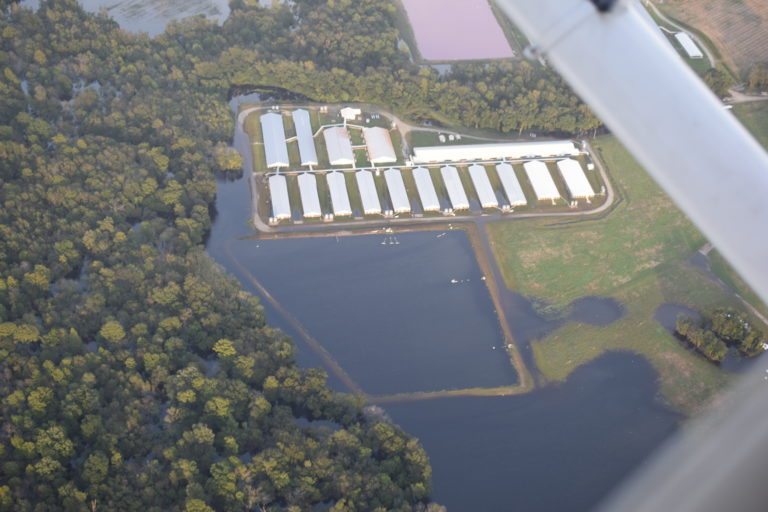
At Waterkeeper Alliance, we’ve spent decades advocating for Smithfield Foods to improve its waste management. The company announced yesterday that it would invest in cesspool covers and digesters to convert swine waste to energy.
This move fails to do what we’ve long demanded: Address the problems pools of swine waste cause for North Carolina’s air and water.
The covers and digesters won’t prevent nutrients and pathogens from seeping into groundwater from unlined cesspools. Covers and digesters won’t eliminate the stench caused by that waste. Covers and digesters won’t prevent the harm to our waters caused when waste is spewed onto nearby fields, often located in low-lying flood-prone areas.
Those water-quality problems endanger not just fish, but people. Studies from eastern North Carolina have shown that lagoons at swine facilities can and do contaminate shallow groundwater with antibiotic-resistant E. coli — and they do so in areas where most of the neighbors depend on well water.
Those odor problems are so severe that leave neighbors of industrial hog operations keep their windows shut on even the hottest days.
In order to truly solve those problems, Smithfield must go further than the actions it announced.
Fortunately, thanks to work done decades ago, the company has better solutions to choose from.
In 1995, a cesspool at a swine facility in Jacksonville burst, spilling 28.5 million gallons of hog waste into a tributary of the New River. In response, the state assembled a Blue Ribbon Commission of experts to identify problems with the “lagoon and sprayfield system,” in which hog waste is kept in open cesspools the size of Olympic swimming pools, then sprayed on adjacent cropland.
The legislature established performance criteria for “environmentally superior technology” to address the problems the commission identified. It also prohibited any new or expanded hog operations that didn’t install technology that met those criteria.
In 2000, Smithfield struck a deal with North Carolina’s then-Attorney General, Mike Easley. Under the agreement, Smithfield and another producer invested $17.1 million in test projects to identify environmentally superior technology. A research group found at least five technologies that did.
Covers and digesters, by themselves, did not.
In fact, covers and digesters can make some of the environmental problems with the “lagoon and sprayfield” system even worse.
Covers and digesters increase the nitrogen content in the swine waste that is sprayed on cropland. So Smithfield’s actions will either increase nutrient pollution where the waste is sprayed or require swine operators to spray on more land, spreading out the nutrient load. That would expose even more people and natural resources to the harm caused by their waste mismanagement.
At Waterkeeper Alliance, we will continue to push for environmentally superior technology that solves the problems with the lagoon and sprayfield system recognized more than two decades ago. Smithfield’s announced “fixes” will only make those problems worse.